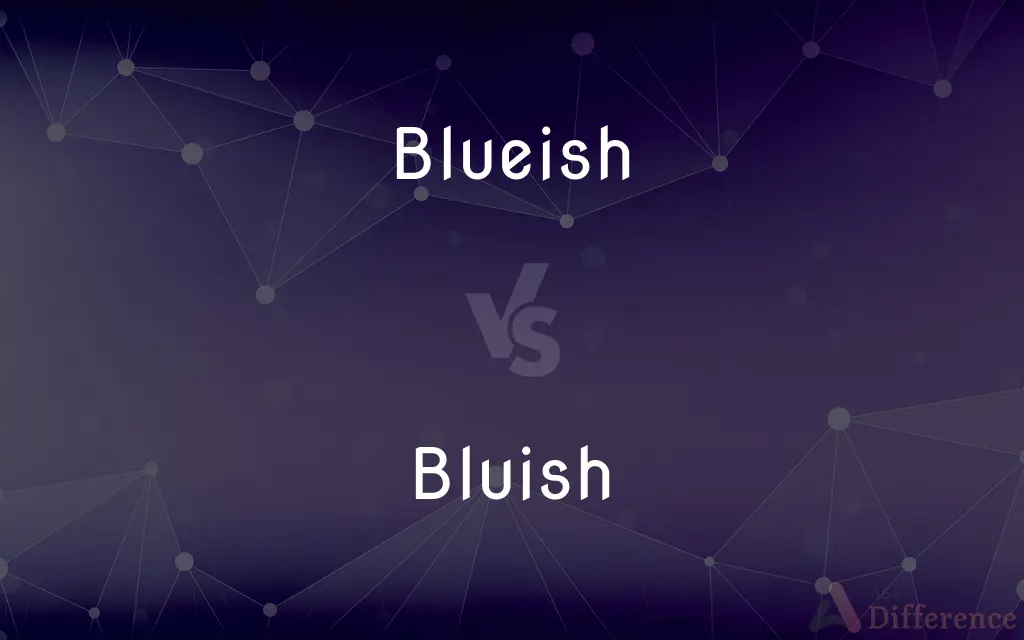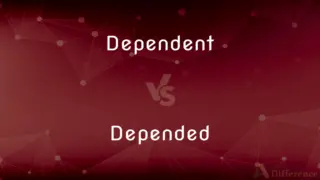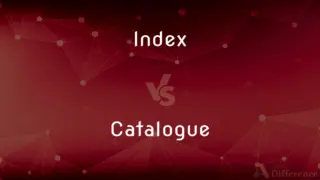Blueish vs. Bluish — What's the Difference?
Edited by Tayyaba Rehman — By Urooj Arif — Updated on March 20, 2024
"Blueish" and "bluish" both describe a slight blue color, but "bluish" is the more commonly accepted spelling in American English.

Difference Between Blueish and Bluish
Table of Contents
ADVERTISEMENT
Key Differences
"Blueish" and "bluish" are adjectives used to describe something that has a slight blue tint or hue. These terms are often used interchangeably to convey the presence of blue in an object or color mixture, though there is a preference for "bluish" in standard American English spelling and usage. This preference is due to standardized spelling conventions in dictionaries and style guides, which typically list "bluish" as the correct form.
The suffix "-ish" is added to color names to indicate that something is somewhat like the color but might not be a pure or strong form of it. In the case of "blueish" vs. "bluish," the suffix serves to soften the intensity of the blue color, suggesting a hint or tint of blue rather than a solid blue color. This is useful in descriptive writing, art, fashion, and design where precision in color description is important.
While "bluish" is more commonly accepted and used, "blueish" might still be encountered in informal contexts or personal writing. The choice between these terms can depend on the writer's or speaker's preference, though "bluish" is recommended for formal or published works to align with standard spelling conventions.
Despite the slight difference in spelling, the meaning and use of "blueish" and "bluish" remain the same. They both serve to describe objects, light, or shades that possess qualities of blue, albeit not strongly. This can apply to various contexts, such as describing the color of the sky at certain times of day, the hue of a garment, or the tint of a paint mixture.
Choosing between "blueish" and "bluish" ultimately comes down to adherence to standardized spelling and the context in which the term is being used. For academic, professional, or formal writing, "bluish" is the preferred choice.
ADVERTISEMENT
Comparison Chart
Spelling Variance
Less common spelling
More common and accepted spelling
Dictionary Acceptance
Less frequently listed in dictionaries
Commonly listed in dictionaries
Usage Context
Informal, personal writing
Formal, academic, professional writing
Meaning
Having a slight blue tint or hue
Having a slight blue tint or hue
Recommendation
Use sparingly in formal contexts
Preferred in all contexts for standard spelling
Compare with Definitions
Blueish
Having a hint of blue.
She noticed a blueish reflection in the water.
Bluish
Indicative of a blue tint or hue.
There was a bluish glow coming from the screen.
Blueish
Slightly blue in color.
The walls were painted a soft blueish tint.
Bluish
Used to denote a color that is not purely blue.
The bluish light of dawn filled the room.
Blueish
Used informally to describe blue-related colors.
His eyes had a distinct blueish sparkle.
Bluish
Slightly blue; having a hint of blue.
The curtains were a bluish shade that complemented the room.
Blueish
Not fully blue, but with blue qualities.
The evening sky turned a pale blueish color.
Bluish
Describing objects or colors with blue qualities.
Her new dress was bluish, matching her eyes.
Blueish
Describing a bluish quality or appearance.
The fabric had a subtle blueish hue under the light.
Bluish
Preferred term for formal descriptions involving blue.
The artist chose a bluish palette for the painting.
Blueish
Variant of bluish.
Bluish
Somewhat blue.
Blueish
Alternative spelling of bluish
Bluish
Having a tint or hue similar to the colour blue.
Blueish
Having a color similar to that of a clear unclouded sky;
October's bright blue weather
A blue flame
Blue haze of tobacco smoke
Bluish
(figuratively) Somewhat depressed; sad.
Bluish
Somewhat blue; as, bluish veins.
Bluish
Having a color similar to that of a clear unclouded sky;
October's bright blue weather
A blue flame
Blue haze of tobacco smoke
Common Curiosities
How do I use "bluish" in a sentence?
Use "bluish" to describe something that has a slight blue color, e.g., "The bluish tint of the glass added a cool tone to the room."
Can "blueish" and "bluish" be used interchangeably?
Yes, they can be used interchangeably in terms of meaning, but "bluish" is recommended for formal contexts.
Is "blueish" a correct spelling?
While "blueish" is understood and sometimes used, "bluish" is the preferred and more commonly accepted spelling.
Is "bluish" acceptable in all forms of English?
Yes, "bluish" is widely accepted in all forms of English, including American, British, and international contexts, as the standard spelling.
What does "bluish" mean?
"Bluish" means having a slight blue color or tint, indicating the presence of blue but not as the dominant color.
Why is "bluish" preferred over "blueish"?
"Bluish" is preferred due to standardized spelling conventions in American English, making it the more accepted form in formal writing.
What is the suffix "-ish" used for in color descriptions?
The suffix "-ish" is used to indicate that something has qualities resembling the base word but may not fully or exactly match it, making colors seem less intense or pure.
How can I remember the preferred spelling between "blueish" and "bluish"?
Remember that "bluish" aligns with most color descriptions ending in "-ish" and is the form listed in dictionaries and style guides.
Are there any rules for when to use "blueish" vs. "bluish"?
While both terms convey the same meaning, the rule of thumb is to use "bluish" for formal, published, or academic work to adhere to standard spelling practices.
Does the choice between "blueish" and "bluish" affect the meaning?
The choice does not affect the meaning, as both terms describe something with a slight blue color, but it may affect the perceived formality or correctness in writing.
Share Your Discovery

Previous Comparison
Dependent vs. Depended
Next Comparison
Index vs. CatalogueAuthor Spotlight
Written by
Urooj ArifUrooj is a skilled content writer at Ask Difference, known for her exceptional ability to simplify complex topics into engaging and informative content. With a passion for research and a flair for clear, concise writing, she consistently delivers articles that resonate with our diverse audience.
Edited by
Tayyaba RehmanTayyaba Rehman is a distinguished writer, currently serving as a primary contributor to askdifference.com. As a researcher in semantics and etymology, Tayyaba's passion for the complexity of languages and their distinctions has found a perfect home on the platform. Tayyaba delves into the intricacies of language, distinguishing between commonly confused words and phrases, thereby providing clarity for readers worldwide.
















































